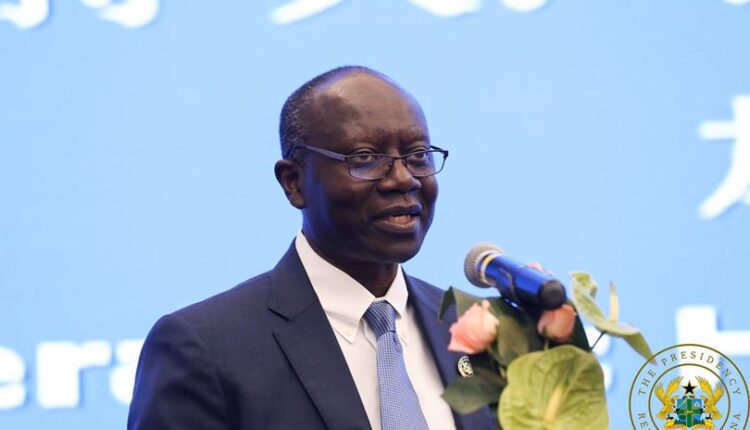Finalise audit on COVID-19 expenditure – IMF tells govt
The International Monetary Fund (IMF) has asked the government to expedite efforts to conclude an audit on its COVID-19 expenditure.
In its July 2021 Article IV Consultation Report on Ghana, the IMF “encouraged the timely completion of the planned audit of COVID‑19 emergency spending and new expenditure arrears.”
This is to ensure transparency in the utilisation of funds allocated for the fight against the pandemic and boost public confidence.
In March 2021, the Finance Ministry indicated that the government had spent GH¢19 billion on the COVID-19 fight.
It also clarified that GH¢1.7 billion was spent on the COVID-19 Alleviation Programme one (CAP1) and Emergency Preparedness and Response Plan one.
Turning its attention to economic recovery, the IMF report noted that the ongoing digitalisation and structural transformation would be critical for Ghana to come out of the woods of the COVID-19 pandemic.
The IMF opined that the completion of programmes on digitalisation and economic recovery could reduce corruption.
Additionally, such efforts would boost tax revenues, and improve service delivery in the country.
“The structural transformation can be complemented by the ongoing energy sector review, diversification in tourism, and the digital transition, which has the potential to reduce corruption, boost tax revenues, and improve service delivery,” IMF noted.
“The authorities’ structural transformation and digitalisation agendas are critical to support the recovery,” IMF said.
Against this background, IMF recommended that the country should “support continued capacity development efforts in these areas.”
Ghana’s digitalisation drive
As part of the Digital Ghana agenda, the country is embarking on an ambitious infrastructure development programme for the ICT sector to bridge the digital divide.
The effort includes a national broadband infrastructure and total connectivity for the unserved and underserved at the heart of the agenda, with the emphasis on ensuring that, “no one will be left behind,” the Communication and Digitalisation Minister, Ursula Owusu Ekuful, has said.
In addition to this, regional Community Information Centres (CIC) has been established to bring government e-services, including postal services, passport services, and birth registrations, closer to communities.
There is also an ongoing exercise to integrate all identity cards with the biometric national identity card (Ghana Card).
The Ministry of Finance has also launched three policy initiatives designed to deepen financial inclusion and accelerate the shift to digital payments, which forms part of the digitalisation and structural transformation agenda.
These are the National Financial Inclusion and Development Strategy, developed in collaboration with the World Bank, aimed at increasing financial inclusion from currently 58% to 85% by 2023.
This project is to help create economic opportunities and reducing poverty.
This project is to build on existing technological gains to create a resilient, inclusive and innovative digital ecosystem that contributes to social development, a robust economy and a thriving private sector.
Lastly, the Cash-Lite Roadmap, designed in collaboration with ‘Better Than Cash Alliance,’ which puts forward concrete steps to build an inclusive digital payments ecosystem.
Financial sector clean-up
Touching on the country’s financial sector clean-up, the IMF observed that the policies and programmes implemented by the government in this area have made the sector more resilient.
Nonetheless, it stressed that the banks’ growing holdings of sovereign debt creates risks and crowds out private sector credit, adding that, “in this regard, they took positive note of ongoing supervisory and regulatory reforms, which are important steps to protect financial stability.
READ ALSO: Ghana Becomes Second African Country To Join FATF
The country was also lauded for the improvements in the anti-money laundering and combating the financing of terrorism (AML/CFT) framework that allowed Ghana to exit the FATF “grey list.”
Ghana was delisted from the Financial Action Task Force (FATF) grey list of countries at a plenary meeting on June 23, 2021.
This was after it satisfactorily completed the action plan in a report by the international corporation review group of FATF.
This decision meant that FATF and, for that matter, the international community had renewed its confidence in Ghana’s anti-money laundering and countering the financing of terrorism regime.
Following the removal of the country from the FATF grey list, the Finance Minister, Ken Ofori Atta, announced that Ghana was aiming to be a member of the global inter-governmental anti-money laundering and terrorist financing watchdog organisation.
If successful, Ghana will be the second African country of the 39-member anti-money laundering and counter-terrorism organisation. Presently, South Africa is the only member from the continent.


